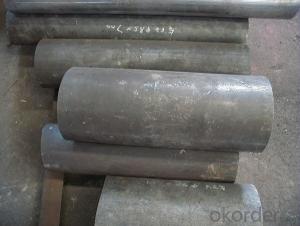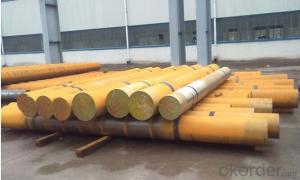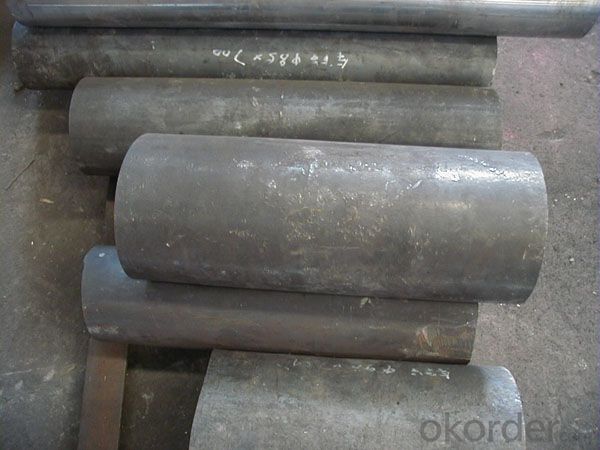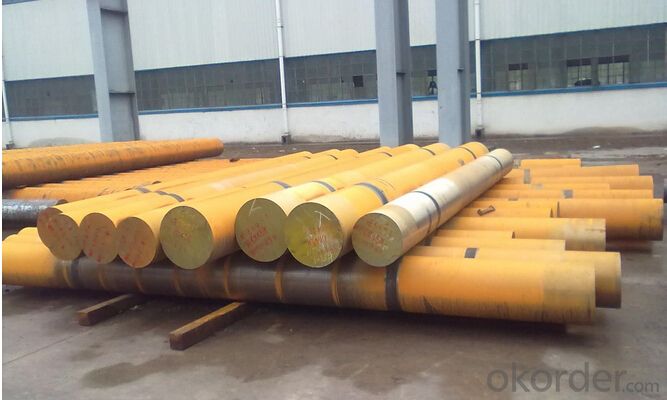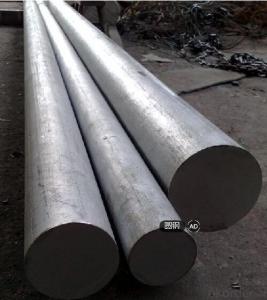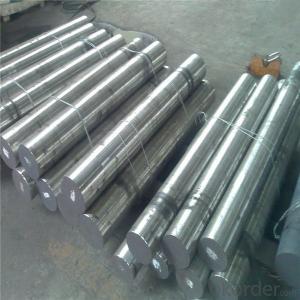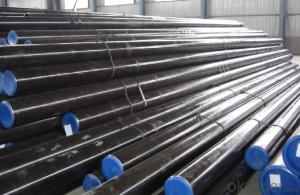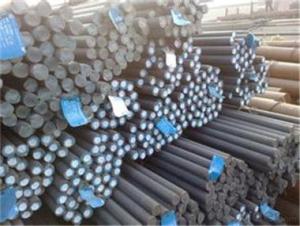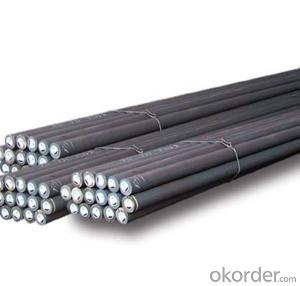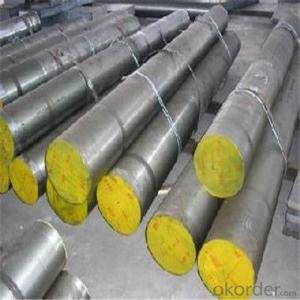Forged Steel Bar S136 / Die Steel S136 / Steel Round Bar S136
- Loading Port:
- China main port
- Payment Terms:
- TT OR LC
- Min Order Qty:
- 25 m.t.
- Supply Capability:
- 10000 m.t./month
OKorder Service Pledge
OKorder Financial Service
You Might Also Like
Specification
The details of our Steel
1. Produce Standard: as the GB, AISI, ASTM, SAE, EN, BS, DIN, JIS Industry Standard
2. Produce processes: Smelt Iron -EAF smelt Billet - ESR smelt Billet -Hot rolled or forged get the steel round bar and plate
3. Heat treatment:
Normalized / Annealed / Quenched+Tempered
4. Quality assurance:
All order we can received Third party inspection, You can let SGS, BV,.. and others test company test and inspect our products before Goods shipping.
Product information
Chemical Composition(%) of steel round bar S136 | C | Si | Mn | S | P | Cr | Mo |
0.34-0.42 | 0.60-1.30 | 0.20-0.70 | ≤0.030 | ≤0.030 | 13.00-14.50 | 0.15-0.40 | |
Specification of steel round bar S136 | Dia.mm*Lmm=100~600*6000 | ||||||
Application of steel round bar S136 | Used for various large-sized mirror plastic mould, precision plastic mould, like, cars accessories, home appliances, electronic equipment plastic mould. | ||||||
Characteristic of steel round bar S136 | 1)Pure and precision mirror polishing,good abrasion resistance | ||||||
Heat Treatment of steel round bar S136 | Normalized / Annealed / Quenched / tempered | ||||||
Product show

Workshop show

- Q: What are the different heat treatment techniques used for special steel?
- There are several heat treatment techniques used for special steel, including annealing, normalizing, quenching, tempering, and case hardening. Each technique serves a specific purpose in altering the properties of the steel, such as improving hardness, strength, toughness, or ductility. Annealing involves heating the steel to a specific temperature and then slowly cooling it to relieve internal stresses and increase ductility. Normalizing is similar to annealing but involves air cooling instead of slow cooling. Quenching involves rapid cooling of the steel to increase hardness, while tempering is a subsequent heating process to reduce brittleness and enhance toughness. Case hardening involves heating the steel in the presence of a carbon-rich atmosphere to increase surface hardness while maintaining a tough core.
- Q: What are the main factors affecting the toughness of special steel?
- The main factors affecting the toughness of special steel are its composition, microstructure, and heat treatment. Composition plays a crucial role in determining the toughness of special steel. The presence of certain alloying elements such as chromium, molybdenum, nickel, and vanadium can enhance the toughness of steel. These elements form solid solutions or precipitates in the steel matrix, which impede the propagation of cracks and improve the material's resistance to fracture. Microstructure also plays a significant role in determining the toughness of special steel. The size, shape, and distribution of the various phases in the steel, such as ferrite, pearlite, bainite, and martensite, affect its toughness. Fine-grained microstructures typically exhibit higher toughness due to their increased resistance to crack propagation. Heat treatment is another essential factor in controlling the toughness of special steel. The process of heating and cooling the steel can modify its microstructure, altering its toughness. Quenching, tempering, and annealing are common heat treatments used to improve the toughness of steel. Quenching and tempering, for example, can produce a microstructure with a desirable balance of hardness and toughness. Other factors that can affect the toughness of special steel include the presence of impurities, non-metallic inclusions, and the presence of residual stresses. Impurities and inclusions can act as stress concentrators and reduce the toughness of the steel. Residual stresses, which can arise during manufacturing processes, can also impact the toughness of the material by creating regions of high stress that can initiate crack formation. In summary, the composition, microstructure, heat treatment, presence of impurities and inclusions, and residual stresses are the main factors affecting the toughness of special steel. Understanding and controlling these factors are crucial for optimizing the toughness and performance of special steels in various applications.
- Q: What are the factors affecting the cost of special steel?
- There are several factors that can affect the cost of special steel. Firstly, the cost of raw materials used in the production of special steel, such as iron ore and alloys, can have a significant impact on its overall price. Additionally, the level of demand for special steel, both domestically and globally, can influence its cost. Factors such as market competition, economic conditions, and government policies can also play a role in determining the price of special steel. Lastly, the complexity of the manufacturing process, including the level of skill required and the use of advanced technologies, can contribute to the higher cost of special steel compared to regular steel.
- Q: What are the environmental impacts of producing special steel?
- The production of special steel can have several environmental impacts. Firstly, the extraction of raw materials, such as iron ore and coal, can lead to habitat destruction and soil erosion. Additionally, the energy-intensive processes involved in steel production, such as smelting and refining, contribute to greenhouse gas emissions, air pollution, and climate change. Moreover, the disposal of waste materials, including slag and dust, can contaminate water sources and harm aquatic life. It is crucial to implement sustainable practices and technologies to mitigate these environmental impacts and ensure responsible steel production.
- Q: Can special steel be used in power generation applications?
- Yes, special steel can certainly be used in power generation applications. Special steel refers to various types of steel that are specifically designed to have enhanced properties such as high strength, durability, heat resistance, corrosion resistance, and wear resistance. These properties make special steel ideal for use in power generation applications where the materials need to withstand high temperatures, pressures, and mechanical stresses. In power generation, special steel can be used in various components and equipment, such as turbine blades, boiler tubes, heat exchangers, steam pipes, and high-pressure valves. For example, in thermal power plants, where fossil fuels are burned to generate electricity, special steel is commonly used in boiler tubes and heat exchangers to withstand the high temperatures and pressures of the steam generation process. Additionally, in nuclear power plants, special steel is used in critical components like reactor vessels, steam generators, and fuel cladding due to its excellent strength, resistance to radiation damage, and corrosion resistance. Furthermore, special steel is also used in renewable energy power generation applications. For instance, in wind turbines, special steel is used in the construction of turbine towers, rotor blades, and gearboxes, as it needs to withstand high wind speeds, vibrations, and fatigue. Overall, special steel plays a crucial role in power generation applications due to its exceptional properties, ensuring the reliability, efficiency, and longevity of the equipment and components used in various power generation systems.
- Q: What are the different non-destructive evaluation techniques used for special steel?
- Some of the different non-destructive evaluation techniques used for special steel include ultrasonic testing, magnetic particle inspection, liquid penetrant testing, radiographic testing, and eddy current testing. These techniques allow for the detection of defects or flaws in the steel without causing any damage to the material.
- Q: How is precipitation-hardening steel used in the aerospace industry?
- Precipitation-hardening steel is commonly used in the aerospace industry due to its exceptional strength-to-weight ratio and high corrosion resistance. This type of steel undergoes a specialized heat treatment process that allows for the precipitation of particles within its microstructure, resulting in improved mechanical properties. These steels are used in various components and structures of aircraft, such as landing gears, engine parts, and structural frames, where strength, durability, and weight savings are crucial factors for performance and safety.
- Q: How does special steel perform in high-temperature strength?
- Special steel, also referred to as high-temperature steel, is engineered for superior performance in applications requiring high-temperature strength. Unlike standard steels, which can weaken and compromise structural integrity at elevated temperatures, special steel maintains its mechanical properties even in extreme heat conditions. The exceptional high-temperature strength of special steel stems from its distinctive composition. It is typically alloyed with elements like chromium, nickel, and molybdenum, significantly enhancing its resistance to thermal expansion, oxidation, and creep. These alloying elements form stable oxides on the steel's surface, creating a protective layer that prevents further oxidation and corrosion, thus preserving the material's strength and integrity. Furthermore, the microstructure of special steel is vital to its high-temperature performance. Through advanced manufacturing techniques, special steel is crafted with a fine-grained structure, enhancing its resistance to deformation and boosting its creep strength. The fine grains also contribute to its ability to retain mechanical properties at elevated temperatures for extended periods. Moreover, special steel undergoes rigorous heat treatment processes, such as quenching and tempering, which further enhance its high-temperature strength. These processes refine the microstructure and optimize the steel's mechanical properties, including hardness, toughness, and resistance to thermal fatigue. In conclusion, special steel is purposefully designed and engineered to excel in applications requiring high-temperature strength. Its unique composition, microstructure, and heat treatment processes contribute to its exceptional resistance to thermal expansion, oxidation, and creep, ensuring that it maintains its mechanical properties and structural integrity even under extreme heat conditions.
- Q: What are the common challenges in forging special steel?
- Forging special steel poses several common challenges that manufacturers and engineers must address in order to achieve desired outcomes. One of the primary challenges in forging special steel is maintaining precise temperature control throughout the process. Special steels often have specific heat treatment requirements, and any deviation from the recommended temperature range can adversely affect the final properties of the material. Achieving and sustaining the right temperature is crucial to ensure desired mechanical properties like strength, hardness, and toughness. Another challenge in forging special steel is controlling the cooling rate during quenching. Quenching is a critical step in the heat treatment process that helps to achieve the desired hardness and strength in special steels. However, rapid cooling can lead to the formation of undesirable microstructures or even cracking. Therefore, carefully managing the cooling rate is essential to avoid these issues and ensure optimal material properties. Additionally, shaping special steels through forging can be challenging due to their high strength and hardness. These materials are often more difficult to deform compared to regular steels, requiring higher forging pressures and specialized equipment. The resistance to deformation can lead to increased wear on the forging dies, requiring frequent maintenance and replacement. Furthermore, special steels may contain alloying elements that can affect their forgeability. Some alloying elements can promote grain growth, which can reduce the mechanical properties of the material. Finding the right balance of alloying elements and optimizing the forging process parameters is crucial to achieve the desired microstructure and properties in the final product. Lastly, ensuring consistency and repeatability in the forging process can be a challenge. Special steels are often produced in smaller quantities or for specific applications, making it important to maintain process control and quality assurance. Proper documentation, monitoring, and quality control measures need to be implemented to ensure that the forged special steel meets the desired specifications and performance requirements. Overall, forging special steel requires careful attention to temperature control, cooling rate during quenching, shaping difficulties, alloying elements, and maintaining consistency. Addressing these challenges through proper process control and optimization is crucial to obtain high-quality special steel products with the desired mechanical properties and performance characteristics.
- Q: What are the main advantages of using special steel in the construction of bridges?
- The main advantages of using special steel in the construction of bridges are its exceptional strength and durability. Special steel alloys offer high tensile strength, allowing for lighter bridge designs and reducing the overall weight of the structure. This not only makes construction and transportation easier but also minimizes the environmental impact. Additionally, special steel exhibits excellent corrosion resistance, ensuring the longevity of the bridge even in harsh weather conditions. Its superior toughness and resistance to fatigue make it ideal for withstanding heavy loads and frequent use, ensuring the safety and reliability of the bridge for many years.
Send your message to us
Forged Steel Bar S136 / Die Steel S136 / Steel Round Bar S136
- Loading Port:
- China main port
- Payment Terms:
- TT OR LC
- Min Order Qty:
- 25 m.t.
- Supply Capability:
- 10000 m.t./month
OKorder Service Pledge
OKorder Financial Service
Similar products
Hot products
Hot Searches
Related keywords
